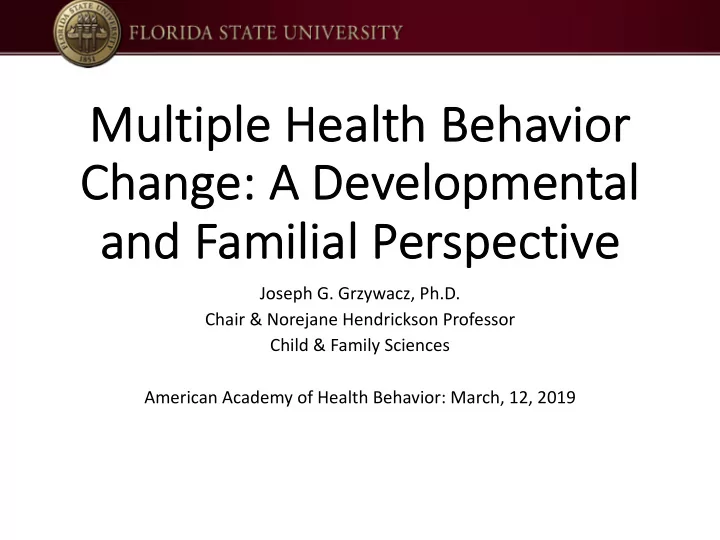

Mu Multi tiple Health th Be Behavi vior or Ch Change: A De Develop opmental and F and Fam amilial P ilial Per erspect pectiv ive Joseph G. Grzywacz, Ph.D. Chair & Norejane Hendrickson Professor Child & Family Sciences American Academy of Health Behavior: March, 12, 2019
Presentation Goal & Aims • Goal: Encourage health behavior scientists to more deliberately incorporate the tools of developmental and family science. • Aims • Illustrate the central thesis through the review of 20-year program of research. • Introduce basic concepts, models and frameworks of developmental and family science, and demonstrate application in Health Behavior Research • Outline steps for more deliberate incorporation of developmental and family science into research on multiple health behaviors
A Walk Down Memory Lane…
100% 75% 50% 25% 0% Acephate Chlorpyrifos Malathion Pyrethroid Zero One Two Three Four
An investigator’s discipline usually dictates the starting point Campbell, T. (1969). Ethnocentrism of disciplines and the fish-scale model of omniscience. In Interdisciplinary relationships in the social sciences (pp. 328-348). Chicago, IL: Aldine.
Conceptual Foundations • Health Behavior Clusters ≠ Lifestyle
Conceptual Foundations • Health Behavior Clusters ≠ Lifestyle. • Change ≠ Development
Conceptual Foundations • Health Behavior Clusters ≠ Lifestyle. • Change ≠ Development • Probabilistic Epigenesis
Conceptual Foundations • Health Behavior Clusters ≠ Lifestyle. • Change ≠ Development • Probabilistic Epigenesis • Family Routines & Rituals
Examples of Developmental & Family Science In Health Behavior Research
Steps to deliberate integration of developmental and family science with health behavior science Campbell, T. (1969). Ethnocentrism of disciplines and the fish-scale model of omniscience. In Interdisciplinary relationships in the social sciences (pp. 328-348). Chicago, IL: Aldine.
Come on in, the water is fine! • Joseph (Joe) Grzywacz • Sounds like “Gree- votch” • jgrzywacz@fsu.edu
Recommend
More recommend